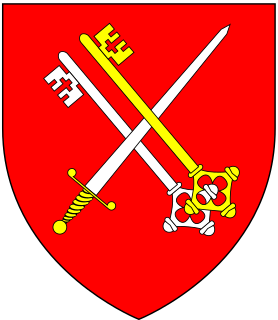Henry of Newark was a medieval Archbishop of York.
Alexander Neville was a late medieval prelate who served as Archbishop of York from 1374 to 1388.
Robert Waldby was a native of York and friar of the Order of Saint Augustine who followed Edward, the Black Prince into Aquitaine. After studying at Toulouse, he became professor of theology there.

Lawrence Booth served as Prince-Bishop of Durham and Lord Chancellor of England, before being appointed Archbishop of York.

The Archbishop of York is a senior bishop in the Church of England, second only to the archbishop of Canterbury. The archbishop is the diocesan bishop of the Diocese of York and the metropolitan bishop of the Province of York, which covers the northern regions of England as well as the Isle of Man. The archbishop of York is an ex officio member of the House of Lords and is styled Primate of England; the archbishop of Canterbury is the "Primate of All England".

The Bishop of Worcester is the head of the Church of England Diocese of Worcester in the Province of Canterbury, England.

The Bishop of Rochester is the ordinary of the Church of England Diocese of Rochester in the Province of Canterbury.

The Bishop of Winchester is the diocesan bishop of the Diocese of Winchester in the Church of England. The bishop's seat (cathedra) is at Winchester Cathedral in Hampshire. The Bishop of Winchester holds ex officio the office of Prelate of the Most Noble Order of the Garter since its foundation in 1348, and Bishops of Winchester often held the positions of Lord Treasurer and Lord Chancellor ex officio. During the Middle Ages, it was one of the wealthiest English sees, and its bishops have included a number of politically prominent Englishmen, notably the 9th century Saint Swithun and medieval magnates including William of Wykeham and Henry of Blois.
John Sherwood was an English churchman and diplomat.

John Booth was a 15th-century English prelate who held numerous appointments in the church and royal service.
William Langton was a medieval English priest and nephew of Archbishop Walter de Gray. William was selected but never consecrated as Archbishop of York and Bishop of Carlisle.
John Climping was a medieval Bishop of Chichester.
Reginald Boulers was a medieval Abbot of Gloucester, Bishop of Hereford and Bishop of Coventry and Lichfield.

Richard Beauchamp was a medieval Bishop of Hereford and Bishop of Salisbury.
Richard of Gravesend was a medieval Bishop of Lincoln.
Thomas Kempe was a medieval Bishop of London.

John Blyth or John Blythe was a medieval Bishop of Salisbury.
Richard Marsh, also called Richard de Marisco, served as Lord Chancellor of England and Bishop of Durham.
Henry Bridgeman, DD was an Anglican clergyman who served in the Church of England as the Bishop of Sodor and Man from 1671 to 1682.
Charles Booth, D.C.L. was a sixteenth-century clergyman who served as the Bishop of Hereford from 1516 to 1535.








